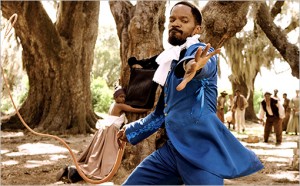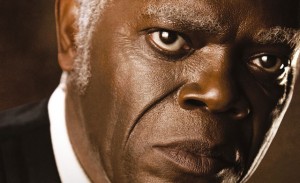Django Unchained As Post-Race Product
Here’s a truth: 2012 has been a hell of a year regarding the state of race and its relationship to media and real life in the so-called “Post-Civil Rights, Post-Race era.” Beginning the year with Trayvon Martin, continuing with the gradual acceptance of the varied public utterances of racism toward the re-election of Barack Obama, and, with respect to this column, and fighting back against the controversy around casting a Black girl as Rue in the Hunger Games, this year has seemed to make me and many scholars of color like myself perhaps more sensitive than normal. This sensitivity is not just one of sadness or hurt but one of frustration; one of anger and contained rage. Because the outpouring of hateful discourse is too much and is ubiquitous and because it hides in plain sight and under protections of socialized ideologies like “racial colorblindness,” many of us (myself included) opt for silence in public venues. It is far more dangerous for me to respond to hateful rhetoric with my own because then I allow myself to be read as that stereotype. Moreover, because of the power of colorblindness, my acknowledging a racial wrong—or acknowledging race at all—results in the burden of proof resting on my shoulders. Still, these issues matter because to be frank, when race is in play our lives are at stake.
 I begin with this truth to discuss Django Unchained because it informs my reluctance to discuss this film. I recognize that my ambivalence belongs to me and that many folks are happy to investigate, interrogate, segment and contextualize the film to determine if the film is harmful or not or plumb interviews given by writer/director Quentin Tarantino to locate his intent in producing such a film. Excellent pieces by wonderful thinkers have emerged and I would do no service to them to repeat what they’ve already written. Instead, I want to offer a few points about how Django actually makes sense in our Post-Race world and why its “good” fit only cements the confusion about how to understand race contemporarily.
I begin with this truth to discuss Django Unchained because it informs my reluctance to discuss this film. I recognize that my ambivalence belongs to me and that many folks are happy to investigate, interrogate, segment and contextualize the film to determine if the film is harmful or not or plumb interviews given by writer/director Quentin Tarantino to locate his intent in producing such a film. Excellent pieces by wonderful thinkers have emerged and I would do no service to them to repeat what they’ve already written. Instead, I want to offer a few points about how Django actually makes sense in our Post-Race world and why its “good” fit only cements the confusion about how to understand race contemporarily.
1.  A friend told me about a girlfriend of hers who shared her confusion around how Black folks are supposed to feel about Django. Based on all the reviews as well as the interviews Jamie Foxx and Kerry Washington gave I can see how this confusion emerges. When Foxx and Oprah Winfrey discuss the film as a tribute of sorts to our enslaved ancestors and posit that it offers the opportunity to have conversations about the “evolution of freedom” from slavery to present day, it does make me question if I’ve misjudged the film’s mission. The burden of representation is so great for people of color that any reason to support a film with “strong” Black lead characters should be reason enough. That there is the possibility of a revisionist redemptive slave narrative is all the better. However, while Django centers around a newly freed slave and while the horrors of slavery are on display in graphic detail, I would not say it was a commentary on the evolution of freedom because the story uses slavery—its most culturally specific factor—as a conceit while the story of Django rescuing his lady love is the main story—the one that is universal and familiar. While there is nothing wrong with a story people can connect to, making it is easy for the average moviegoer to relate to Django does align with the goals of Post-Race logic where finding “common ground” supersedes the specific historical differences that actually marginalize groups.
A friend told me about a girlfriend of hers who shared her confusion around how Black folks are supposed to feel about Django. Based on all the reviews as well as the interviews Jamie Foxx and Kerry Washington gave I can see how this confusion emerges. When Foxx and Oprah Winfrey discuss the film as a tribute of sorts to our enslaved ancestors and posit that it offers the opportunity to have conversations about the “evolution of freedom” from slavery to present day, it does make me question if I’ve misjudged the film’s mission. The burden of representation is so great for people of color that any reason to support a film with “strong” Black lead characters should be reason enough. That there is the possibility of a revisionist redemptive slave narrative is all the better. However, while Django centers around a newly freed slave and while the horrors of slavery are on display in graphic detail, I would not say it was a commentary on the evolution of freedom because the story uses slavery—its most culturally specific factor—as a conceit while the story of Django rescuing his lady love is the main story—the one that is universal and familiar. While there is nothing wrong with a story people can connect to, making it is easy for the average moviegoer to relate to Django does align with the goals of Post-Race logic where finding “common ground” supersedes the specific historical differences that actually marginalize groups.
2.  One of the patterns in the film that struck me was Django’s sole goal of freeing his wife Broomhilda from the Candie Plantation. It struck me because it was such an individualistic objective. One free former slave rescuing one enslaved woman from the horrors of slavery is a lofty goal to be sure; however, it seems antithetical to the ways that slaves functioned as a community system. The conscious choice, for example, to have Django never look back at his brethren–even after he has killed all their captors–and leave them in cages so they can watch him him ride back to the plantation to free his wife seems off. Why not arm them so they can all get their revenge on the evil slave owners? Perhaps it is because he was trained by his mentor Dr. King (ha) Schultz to treat being a bounty hunter as a solo gig. However, I can neither imagine the process of becoming free nor the disconnecting of emotional ties to other slaves as occurring overnight. Thus I contend that the emphasis on the individual achieving his aims rather than on the collective is a product of Post-Race logic that is not necessarily interested in slavery as anything other than an elaborate and terrible backdrop. Besides, a gang of enslaved men taking on slave owners in a raid seems far more menacing for a 21st century mainstream audience than one man in a velvet suit.
One of the patterns in the film that struck me was Django’s sole goal of freeing his wife Broomhilda from the Candie Plantation. It struck me because it was such an individualistic objective. One free former slave rescuing one enslaved woman from the horrors of slavery is a lofty goal to be sure; however, it seems antithetical to the ways that slaves functioned as a community system. The conscious choice, for example, to have Django never look back at his brethren–even after he has killed all their captors–and leave them in cages so they can watch him him ride back to the plantation to free his wife seems off. Why not arm them so they can all get their revenge on the evil slave owners? Perhaps it is because he was trained by his mentor Dr. King (ha) Schultz to treat being a bounty hunter as a solo gig. However, I can neither imagine the process of becoming free nor the disconnecting of emotional ties to other slaves as occurring overnight. Thus I contend that the emphasis on the individual achieving his aims rather than on the collective is a product of Post-Race logic that is not necessarily interested in slavery as anything other than an elaborate and terrible backdrop. Besides, a gang of enslaved men taking on slave owners in a raid seems far more menacing for a 21st century mainstream audience than one man in a velvet suit.
3 . My last point of illustrating that Django is a product of the Post-Race lies in the supporting character of Steven. Played by Samuel L. Jackson, is a conflation of types: Uncle Tom, Boondocks-famous Uncle Ruckus, as well as a well-versed code-switcher. For me, Steven’s intraracial hatred in concert with being the smartest character of them all made him the most evil. A brilliant performance to be sure; however, I could not help but think that for many moviegoers in the film, the black-on-black violence diminished the impact of the fact that both men were enslaved psychologically and physically, instead placed the burden of evil on them hating each other with this subtle shift.
. My last point of illustrating that Django is a product of the Post-Race lies in the supporting character of Steven. Played by Samuel L. Jackson, is a conflation of types: Uncle Tom, Boondocks-famous Uncle Ruckus, as well as a well-versed code-switcher. For me, Steven’s intraracial hatred in concert with being the smartest character of them all made him the most evil. A brilliant performance to be sure; however, I could not help but think that for many moviegoers in the film, the black-on-black violence diminished the impact of the fact that both men were enslaved psychologically and physically, instead placed the burden of evil on them hating each other with this subtle shift.
In conclusion, I would suggest that this racial moment produced Django. This is the moment where a horrible past is so far removed that it can be redeemed through a fantastical story that if set in modern day would scare its moviegoers. That is indeed the gift of a Post-Race era.



At the end of the day, it’s a “cake and eat it too” movie. As was “Inglorious Basterds”. Not to say that both are entertaining, or that they can’t be wrestled into some context where they offer throught provoking commentary. But it is that very wrestling, that mental game of Twister, that is the signature Watusi of a white critical world. I accept this, and watch it with the fascination that I did the dancers on “American Bandstand” trying their darndest to approximate funk.
Thanks for a thoughtful post.
At the end of the day, it’s a “cake and eat it too” movie. As was “Inglorious Basterds”. Not to say that both are not entertaining, or that they can’t be wrestled into some context where they offer throught provoking commentary. But it is that very wrestling, that mental game of Twister, that is the signature Watusi of a white critical world. I accept this, and watch it with the fascination that I did the dancers on “American Bandstand” trying their darndest to approximate funk.
Thanks for a thoughtful post.
Great comments. The most intriguing for me is the point it raises at the end of part 1 about the constraints placed on cultural narratives (and perhaps by extension political change/action) by the perceived or maybe practical (or maybe real?) need (or is it merely the desire?) for identification. It seems that the dynamics of media fragmentation only exacerbate our need/desire to identify with someone or something in order to care about it; and they also are likely making it all the harder to do so.
I think this is right on. The most important point to me is “if it was set on modern day would scare movie goers”. Pick any contemporary injustice and put multiple murders at the solution end of it and the commentary would be wildly different. Thanks for posting.
As a black man I enjoy Tarantino’s movies, Pulp Fiction, Django. I feel they are empowering to me in a sense.